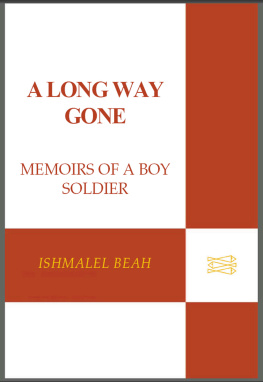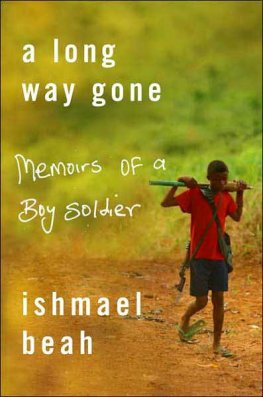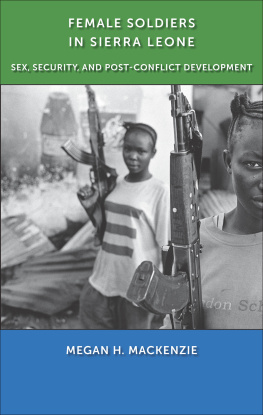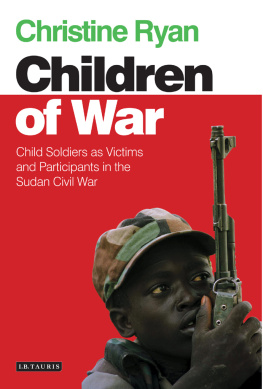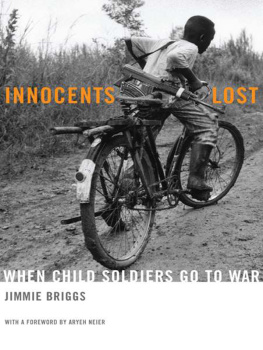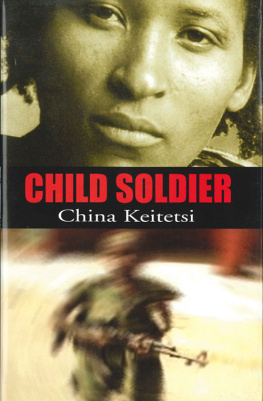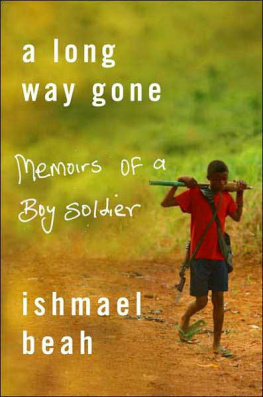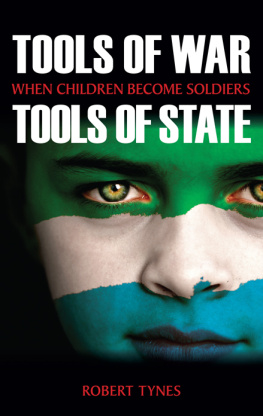Praise for A LONG WAY GONE
Beahspeaks in a distinctive voice, and he tells an important story.
J OHN C ORRY , The Wall Street Journal
Americans tend to regard African conflicts as somewhat vague events signified by horrendous conceptsmassacres, genocide, mutilationthat are best kept safely at a distance. Such a disconnect might prove impossible after reading A Long Way Gone ,a clear-eyed, undeniably compelling look at wartime violence Gone finds its power in the revelation that under the right circumstances, people of any age can find themselves doing the most unthinkable things.
G ILBERT C RUZ , Entertainment Weekly
His honesty is exacting, and a testament to the ability of children to outlive their sufferings, if given a chance.
The New Yorker
This absorbing accountgoes beyond even the best journalistic efforts in revealing the life and mind of a child abducted into the horrors of warfareTold in clear, accessible language by a young writer with a gifted literary voice, this memoir seems destined to become a classic firsthand account of war and the ongoing plight of child soldiers in conflicts worldwide.
Publishers Weekly (starred review)
Deeply moving, even upliftingBeahs story, with its clear-eyed reporting and literate particularitywhether hes dancing to rap, eating a coconut or running toward the burning village where his family is trappeddemands to be read.
L IZA N ELSON , People (Critics Choice, four stars)
Beah is a gifted writerRead his memoir and you will be hauntedIts a high price to pay, but its worth it.
M ALCOLM J ONES , Newsweek.com
When Beah is finally approached about the possibility of serving as a spokesperson on the issue of child soldiers, he knows exactly what he wants to tell the worldI would always tell people that I believe children have the resilience to outlive their sufferings, if given a chance. Others may make the same assertions, but Beah has the advantage of stating them in the first person. That makes A Long Way Gone all the more gripping.
C AROL H UANG , The Christian Science Monitor
In place of a text that has every right to be a diatribe against Sierra Leone, globalization or even himself, Beah has produced a book of such self-effacing humanity A Long Way Gone transports us into the lives of thousands of children whose lives have been altered by war, and it does so with a genuine and disarmingly emotional force.
R ICHARD T HOMPSON , Star Tribune (Minneapolis)
It would have been enough if Ishmael Beah had merely survived the horrors described in A Long Way Gone . That he has written this unforgettable firsthand account of his odyssey is harder still to grasp. Those seeking to understand the human consequences of war, its brutal and brutalizing costs, would be wise to reflect on Ishmael Beahs story.
C HUCK L EDDY , The Philadelphia Inquirer
Beahs memoir is off the charts in its harrowing depictions of cruelty and depravity. What saves it from being a gratuitous immersion in violence is his brilliant writing, his compelling narrators voice, his gift for telling detailThis war memoir haunts the heart long after the eyes have finished the final page.
J OHN M ARSHALL , Seattle Post-Intelligencer
That Beah survived at all, let alone survived with any capacity for hope and joy at all, is stunning, and testament to incredible courageThat Beah could then craft a memoir like this, in his second language no less, is astounding and even thrilling, for A Long Way Gone is a taut prose arrow against the twisted lies of wars.
B RIAN D OYLE , The Oregonian
Beah writes his story with painful honesty, horrifying detail, and touches of remarkable lyricismA must for every school collection.
R AYNA P ATTON , VOYA
A Long Way Gone is one of the most important war stories of our generationIshmael Beah has not only emerged intact from this chaos, he has become one of its most eloquent chroniclers. We ignore his message at our peril.
S EBASTIAN J UNGER , author of The Perfect Storm: A True Story of Men Against the Sea
This is a beautifully written book. Ishmael Beah describes the unthinkable in calm, unforgettable language.
S TEVE C OLL , author of Ghost Wars: The Secret History of the CIA, Afghanistan, and Bin Laden, from the Soviet Invasion to September 10, 2001
A Long Way Gone is a wrenching, beautiful, and mesmerizing tale. Beahs amazing saga provides a haunting lesson about how gentle folks can be capable of great brutalities as well as goodness and courage. It will leave you breathless.
W ALTER I SAACSON , author of Einstein: His Life and Universe
ISHMAEL BEAH
A LONG WAY GONE
Ishmael Beah was born in Sierra Leone in 1980. He moved to the United States in 1998 and finished his last two years of high school at the United Nations International School in New York. He graduated from Oberlin College in 2004. He is a member of the Human Rights Watch Childrens Rights Division Advisory Committee and has spoken before the United Nations, the Council on Foreign Relations, the Center for Emerging Threats and Opportunities (CETO) at the Marine Corps Warfighting Laboratory, and many other NGO panels on children affected by war. He is also the head of the Ishmael Beah Foundation, which is dedicated to helping former child soldiers reintegrate into society and improve their lives. His work has appeared in VespertinePress and LIT magazine. He lives in Brooklyn.
A LONG WAY GONE
Memoirs of a Boy Soldier
ISHMALEL BEAH
SARAH CRICHTON BOOKS
Farrar, Straus and Giroux
New York
To the memories of
Nya Nje, Nya Keke,
Nya Ndig-ge sia, and Kaynya.
Your spirits and presence within me
give me strength to carry on,
to all the children of Sierra Leone
who were robbed of their childhoods,
and
to the memory of Walter (Wally) Scheuer
for his generous and compassionate heart
and for teaching me the etiquette of
being a gentleman
A LONG WAY GONE

New York City, 1998
M Y HIGH SCHOOL FRIENDS have begun to suspect I havent told them the full story of my life.
Why did you leave Sierra Leone?
Because there is a war.
Did you witness some of the fighting?
Everyone in the country did.
You mean you saw people running around with guns and shooting each other?
Yes, all the time.
Cool.
I smile a little.
You should tell us about it sometime.
Yes, sometime.
Contents
T HERE WERE ALL KINDS of stories told about the war that made it sound as if it was happening in a faraway and different land. It wasnt until refugees started passing through our town that we began to see that it was actually taking place in our country. Families who had walked hundreds of miles told how relatives had been killed and their houses burned. Some people felt sorry for them and offered them places to stay, but most of the refugees refused, because they said the war would eventually reach our town. The children of these families wouldnt look at us, and they jumped at the sound of chopping wood or as stones landed on the tin roofs flung by children hunting birds with slingshots. The adults among these children from the war zones would be lost in their thoughts during conversations with the elders of my town. Apart from their fatigue and malnourishment, it was evident they had seen something that plagued their minds, something that we would refuse to accept if they told us all of it. At times I thought that some of the stories the passersby told were exaggerated. The only wars I knew of were those that I had read about in books or seen in movies such as Rambo: First Blood , and the one in neighboring Liberia that I had heard about on the BBC news. My imagination at ten years old didnt have the capacity to grasp what had taken away the happiness of the refugees.

